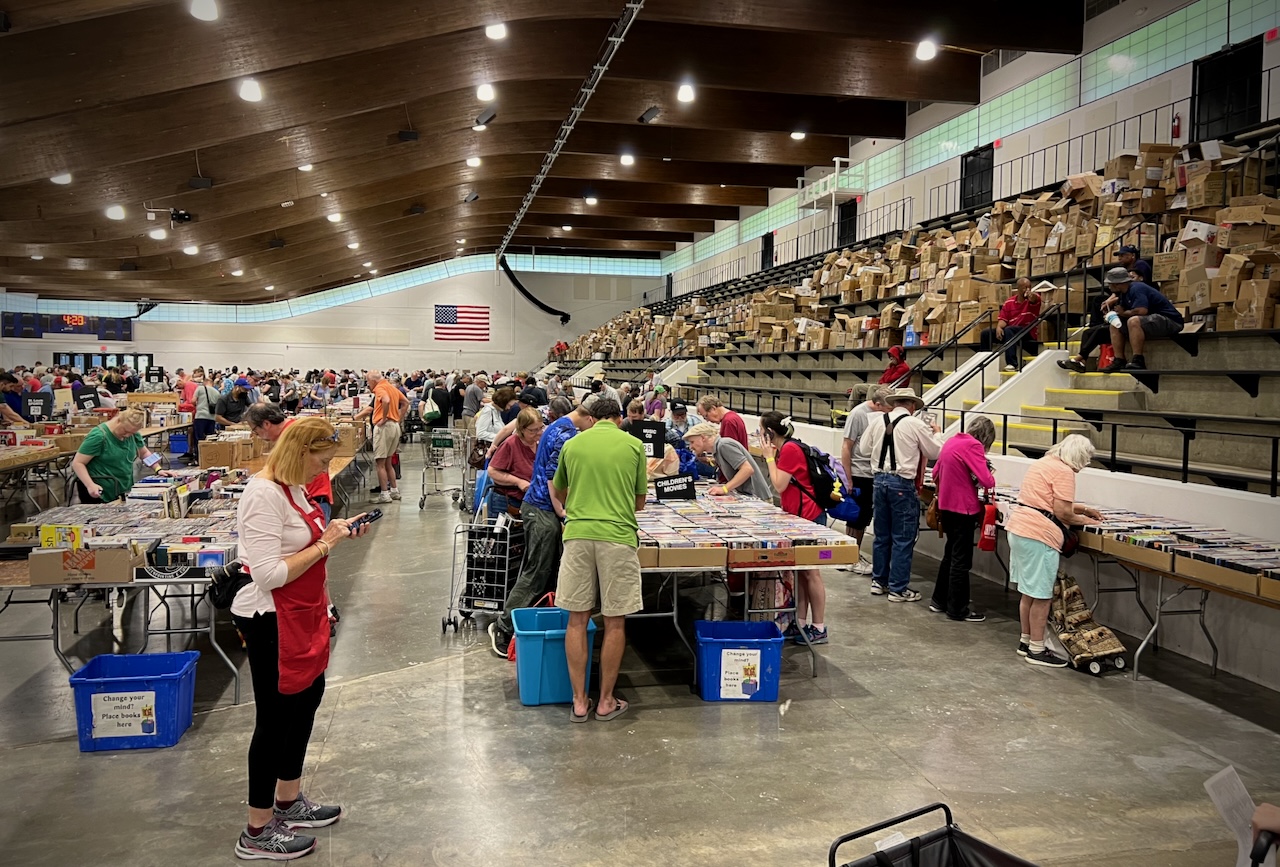
(Photo by John Griswold)
Yesterday I felt a great disturbance in the metro area, as if a million books had cried out at not being read. Then I remembered it was the afternoon of the preview for the annual Greater St. Louis Book Fair, now in its 74th year, billed as the Midwest’s largest charity book fair. I had never been and drove across the city at rush hour to the park-district skating rink where it was being held. When I saw the full lots, I knew reports of the death of the book had been greatly exaggerated.
I had to park on the side of the road and walk a ways. A big guy in camper shorts and a T-shirt for the Overland, Missouri, Boy Scout troop steamed past; I thought I might have to arm wrestle him for some of the better books. Then I saw the rest of the competition. Two lines stretched back from the entrance—hundreds of people with bags (I had forgotten to bring one) and even wagons to carry their hauls, and more people running to get in line.
A friend had asked me to buy some rare or collectible items we had seen online beforehand, and I had cogitated over buying a $15 general admission bracelet or the $25 one for special admission. I need not have bothered. A guy at the end of a line showed me his special bracelet with the number 220 on it. I went and got in the cheap line.
As it turned out, everyone went in within ten minutes of each other. I went straight to the rare books and collectibles section. To my surprise, none of the special-admission people were there, and all the items listed online were still available. A middle-aged man was looking at a St. Louis map from the early 1800s spread out on the table. He leaned over and peered more closely, which set up a chase response in me. I wanted it.
“Eh, I’ll think about it,” he told the volunteer. I did not want it anymore.
An army of volunteers had already sorted the donated items and placed them on rows upon rows of tables—more than a million hardcover and paperback books, records, CDs, DVDs, comics, and ephemera. Hundreds of boxes still sat unopened on the bleachers. Sections were broken down into genres, even to the level of different periods of history, African American fiction, or rare cookbooks. If I wanted I could have showed up with $1500 and had a very fine small library in any topic, or a variety of topics, by that evening. Proceeds went to various literacy charities.
Pro attendees were skimming the books, looking for saleable ones. One man had his smartphone attached to his forearm, with a complicated-looking app running on it; he held a tiny scanner in his fingers and shot barcodes on every book, checking to see what would bring a profit.
I had what I had come for—most of it oversized—and was sagging with fatigue but could not leave without doing a slow circuit of the entire floor. When I finally left, a woman sitting on a bench outside the main door looked at me, amused, and said, “Find anything good for $15?”
“I found good stuff. I don’t know about $15,” I said, struggling to carry my haul.
“Well, we thought we’d come on the opening night and give it a try,” she said. She was still talking, but I could not stop for fear of dropping something. Then I had to choose which
direction to go on the ring road to get home, both with choke points at that hour. Traffic does not endear cities to me, but the book fair is one of the best cultural events I have been to in St. Louis, and many books will find new homes and be well-loved.
The book fair will be open 9:00-2:00 tomorrow, Sunday, with free admission and half-price books: 550 Weidman Road, Manchester, MO 63011.
